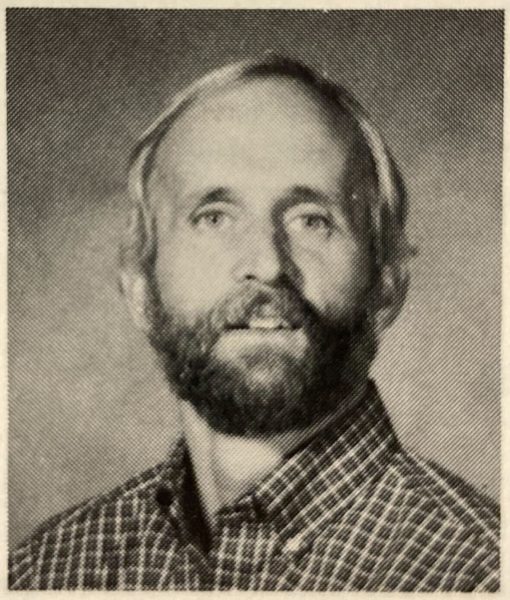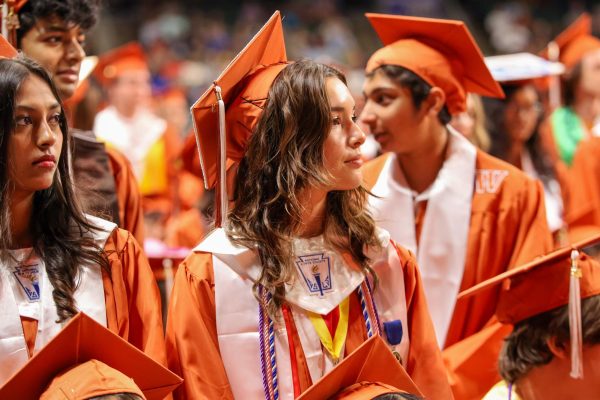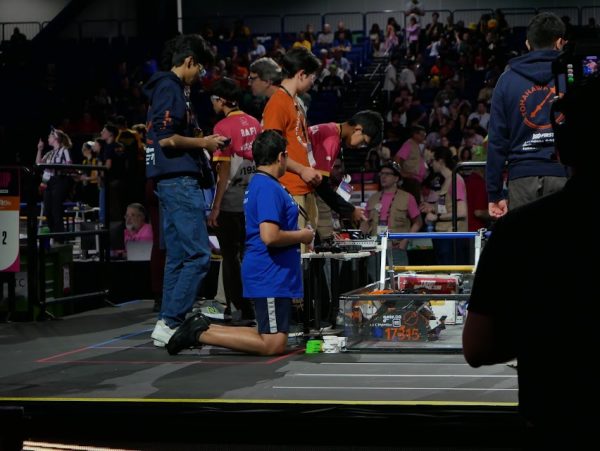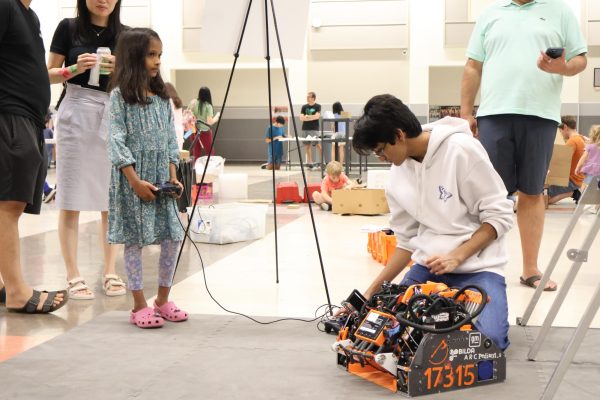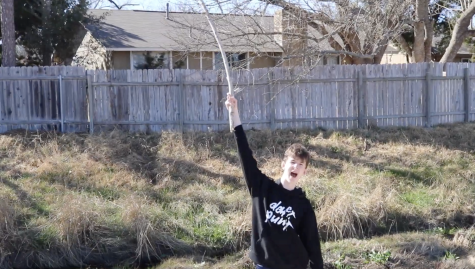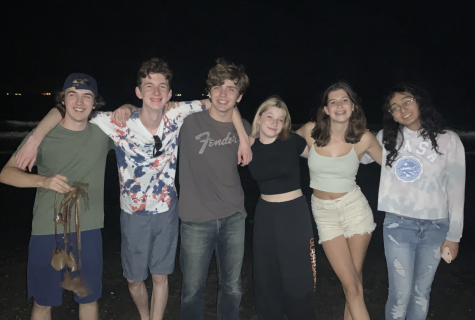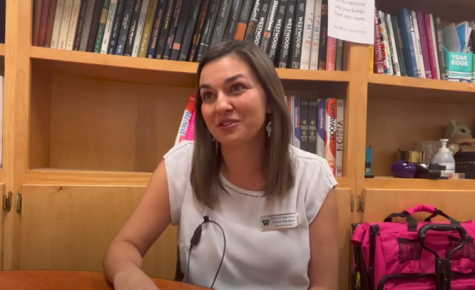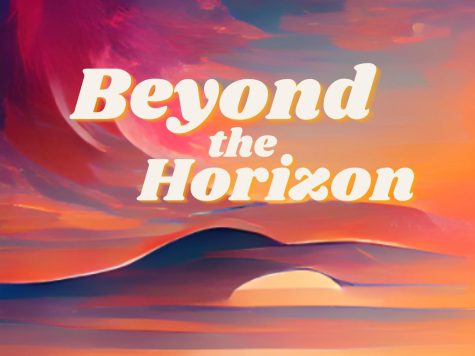Stability and Change: Ms. Campbell Discusses Progress and Priorities
Former Associate Principal Erin Campbell was recently announced as the new principal of Westwood High School on June 16. A graduate of Westwood herself, Ms. Campbell has worked in education for 17 years, the last 5 of which she spent at Westwood, first as an assistant principal, and then as associate principal. As associate principal, Ms. Campbell worked on restorative practice focused professional development, as well as leading the campus equity task force. With her appointment as principal, Ms. Campbell is working to bring a sense of stability to her new position.
The following interview with Ms. Campbell has been edited and condensed to maintain clarity.
What influenced you to apply for the position of principal?
Westwood [is] a really special place for me, having been a student here. And I’ve been an administrator now for [eight] years. For me, I was not in a hurry to be a principal. I’ve always been about wanting to be [in] the right place [with] the right opportunities. And [to me], Westwood is a place that I want to stay at forever. So when that opportunity came up, when Dr. Acosta left, it was the right place for me to say, “I can stay at Westwood, I can have an even bigger impact on this community.” I think the influence was that this was the right position for me and a time that I was ready to take that on.
Prior to this, you were an associate principal and an assistant principal, how do you think those experiences will impact your work as principal?
It’s interesting, the assistant principal role and the associate principal role, they’re actually pretty different. I don’t know that many students really know the distinction between the two.
In the assistant principal role, you’re working a lot closer with a specific group of students and families. You have an alphabet group [of students] that you’re responsible for, so you get to form relationships with specific families over time. [You] help them with different facets of their educational experience, whether that’s disciplinary or [attendance-based], or whatever [is] need[ed] to help students be successful getting through Westwood. It’s really focused on case management of students.
When you move into the associate role, [it’s] different. You don’t have that caseload of students anymore. I really was engaging in a lot of the bigger projects that impact the school as a whole, [like] a lot of curriculum and instructional vision, getting to work on planning professional development for teachers, [and] actually presenting for teachers. [I was] really working as the right-hand person for the principal, to either execute the principal’s vision or to provide ideas and say, “Hey, let’s do this initiative, I think this would really support our goal over here.”
The assistant principal role is so critical because you really get that opportunity to understand how the work of the school is impacting families and kids in a real personal way. Moving into the associate role was great because I had a lot of that natural exposure to everything Dr. Acosta was doing, [and] I was able to really have this awesome window into the principal work, and I was able to support [the principal’s work] through a lot of my own efforts in the ways that I described.
Do you think these experiences will be a benefit coming into the role of principal?
Absolutely, and whenever someone becomes a principal- you don’t become a principal without being at least an assistant principal first. [However], the associate principal role is one that’s pretty unique. [So] there’s no way that everyone would funnel through being an associate principal, [before being] a principal, [although] everyone has been an assistant principal before [they were] principal.
So it’s super, super critical, for me. I feel really fortunate that I [got] to have that associate principal role. I feel especially fortunate that I had those roles here at Westwood. If I had come in from somewhere else with the same resume, but a [different school], I would have lots of experience for sure; I would be capable and confident to step into the role. But I would have so much to learn and understand. [The] little details of, “we call it Orange day, we call it White day,” just the little things that make Westwood Westwood. I would have to learn all of that on top of everything else.
So it’s exciting to me that I have that really firm foundation of understanding of how Westwood works. What are areas [where we’re] always successful and strong. What are [the] areas that, maybe especially coming out of COVID that we say, hey, we need to reinvigorate this. I know where I can plug myself in and start having an impact sooner versus later, just by nature of having already been here.
What is your vision for Westwood in the future?
Well, [for] this first year, [if] I was to first talk big and then dial it back in, I have a big goal for faculty, a big goal for families, and a big goal for students.
[My] big goal for students is [that] when [they] leave [high school], I want our students to feel like there’s no better place [than Westwood] [where] they would have wanted to get their high school diploma. And then, whatever step comes after high school, whether that’s college, [the military], career-trade school, [going] right into the workforce, whatever it is, I want all of our students to feel like they were prepared for that step, and I feel confident in that goal being achievable.
It’s already something we achieve most of the time. That was my experience, I know [after] I went through high school, [when] I went to college, [I] felt like college was easy because I was so well prepared from Westwood. And I know [that] from my peers at the time, but that was the case for so many. I want [our students] to have that feeling.
Moreover, I want our students to feel when they grow up if they choose to have kids, that they would send [their] kids to Westwood.
For parents and families, kind of adjacent to that [goal], I want them to feel like their kids [are receiving] the best education they could. I want our families, parents, guardians, and everyone who supports our students to feel like Westwood is a place where they’re welcome, [Where] they feel like they have a partnership with the school, whether that’s with teachers, the administration, [or] the counseling team, and that they know it’s a home away from home for [their] kid. And if [they] stepped through the doors here to come into the main office they feel like it’s a welcoming environment for them as well.
And then for the [faculty], my goal is that this is a place [that] they want to retire from. Education is a hard career [and] not every person who enters education stays in education, especially right now, coming out of the pandemic. So my [largest] goal is [to] keep our educators in education. We want them to [want to] be an educator at Westwood until [they] can retire.
Then, dialing it back, you gotta take it increments at a time because that’s what’s most important. When you start a new leadership role, you have to really think about how [you are] going to start moving on that journey.
This year, you’re going to see me wanting to hear from students, from parents, [and] from faculty, to help me reach those goals. We need to be able to have a lot of opportunities for people to give me that feedback. A lot of input gathering, to see what are things that are urgent, [and] what are things that we need to start planning toward so that we can get to that long-term goal.
Do you have any priorities that you already know that you want to try and accomplish short term?
The biggest thing is the total wellness of everybody who’s here. We can’t have this conversation without addressing that the impact of the last two school years has been tremendous on everybody, students especially.
And last school year, I don’t know how [students] felt, but as faculty, we felt like we were going back to normal, and we had this expectation that things were going to feel exactly like they did in 2019. And they didn’t. And we took for granted that what we had been through was traumatic [and] life-altering, and it wasn’t a switch we could [just] flip back.
Coming into the school year, I’d like to think that we’re all a little bit wiser [and] we don’t have expectations that this [year] is going to look anything like 2019 or 2021. Again, going back to listening, my biggest goal is to hear from students. I’m in touch with faculty, a lot of us work in the summer, and I’ve already started having those conversations, but I want more opportunities to talk to students to find out what [students need] to feel like [they’re] at a stable place again.
[That’s] my number one goal. [When] we ended last school year, I think we had a little bit of rockiness. In April, where we did that hard reset of Flex. We tried to put some stability and order back in place [when] things were kind of off the rails a little bit. So I want to make sure that we’re starting with stability. What’s hard is if we [go] too far off the rails, and we have to yank everybody back. I think that was pretty jarring for everybody, and I want to avoid that.
Hopefully having enough opportunities to hear from students very, very early will help with that so the year goes smoothly. Setting my short-term goal, how we get through this year with everyone returning to or maintaining a place of wellness and happiness, and not letting anything get off the rails to [the extent] where we have to yank it back and cause everyone to feel like things are turned upside down.
So coming back from these past two years, as we begin to finish returning to normalcy, are there any things that you feel we should continue going into this next year?
It’s good for us to continue to give each other grace [across] all the relationships and cross paths that we have as different parts of this Westwood puzzle. [I] think there [were] moments last year where we weren’t always able to give that to each other, and that’s where the friction happened.
[We should continue] just recognizing that we’ve all been through [a] crazy [time] that [was] unprecedented for all of us, and recognizing that we’re all in this together. We’re all in education. I mean [students] are here because you have to be, but [at] large Westwood students invest in learning and come to school each day because they really want to learn. Our teachers come here because they love teaching, and they’re passionate about kids learning. So we’ve got to return to that core of [why] we’re here, and part of our vision as a faculty is to transform lives for the betterment of society.
In terms of things we’re going to maintain, staying true to [our vision], and taking a step back with faculty [to reevaluate] our vision. That [is important to me], but in terms of what we are keeping, our vision, the direction we’re going [in], [and] structures and things that matter for you guys. There’s nothing in my plans to say we’re gonna change [the] block schedule, or [flex], or flip the bell schedule around, nothing wild like that.
Again, going back to that wellness constant concept, what we all need right now is things that are reliable and stable. You think about last school year and one of the reasons why it caught us off guard is we had all those variants, at the beginning of the year with Delta and then in January with Omicron. We kind of felt like we were hitting our rhythm and knew what we were doing, and then that kind of dropped on our heads.
It’s hard for the school [to have] a new leader, a new principal, and when Dr. Acosta announced he was leaving, I think the whole community felt this sense of unease and uncertainty. So my hope is that in these initial months I can provide that sense of confidence and calm. We know what to predict and expect, and everyone feels like they can take care of what they need to because they have that stability provided.
Are there any small changes you’d like to make? For example, in the beginning of last school year, we had staggered releases because of Covid-19. Are there any small adjustments you’d like to make so we can completely go back to normal?
It’s interesting because this pandemic has been hard to predict. If you [had] asked that question in July of 2021, we would have said, everything’s going to be normal, and everybody gets out [of school] at 4:20. At this point last year [we] didn’t know that Delta was about to come raging. So I don’t know that I can answer that perfectly because I can’t predict what’s going to happen a month or a month and a half from now.
But there isn’t anything already in my mind that we’ve got to fix. For now, we’re excited about some things in August like Fishbowl. We didn’t get to do a normal Fishbowl last year, and certainly didn’t the year before that, so we’re returning to our traditional model of Fishbowl, which includes having a school dance, a pep rally, and having the event indoors. So we’re really excited about being able to turn back on some of the traditional structures that we weren’t quite ready to do yet last year. That’s what is on my agenda and what I’m excited about [short-term].
Are you keeping Flex?
Flex is an important one for me. When I came to Westwood in 2017, I’d been an administrator at a high school in Austin ISD, and one of my big projects over there was [their] Flex program, so I was really excited to get to develop [Flex] here at Westwood. And we involved so much input from students and teachers to really build the model.
We rolled flex out in [the] fall [of] 2019. And during that first semester, semester and a half, we were really keeping frequent touch points with our teacher Flex committee and with students. We were making tweaks and adjustments. And then, we all went home in March. [That] school year was largely virtual, [so] we didn’t really have Flex, and then [when] we came back this year, we just kind of turned it back on where it was. This year, I want to be able to talk with students and talk with teachers and figure out [if we’re] getting our bang for our buck out of flex. Does everybody feel like it’s meeting their needs?
By and large, anecdotally, I feel like there’s widespread support of Flex. I can point to the example of April and how upset people were when they lost the freedom of Flex. But I want us to be able to look back [on] even the early days of installing Flex here and [ask] “What was our mission of Flex? What was our mission statement? What were the goals and reasons why we said we need this?” Because Westwood existed for decades without flex. Students achieved very high accolades without flex.
However, we know that there was a really sound set of reasons as to [why] we put Flex in place. So we need to return to that and say, “Are we meeting that with the system that we have?” So [we have] no plans to halt it, to throw it out. For sure, it’s here. But I think there’s an opportunity to improve on it. And to make sure that everyone feels like it’s successful in meeting their needs.
Around the same time last school year, as restrictions on Flex were put in place, there were concerns about student discipline with issues such as graffiti in the bathrooms. Are there any ideas or changes you’d like to implement regarding that?
[I’d like to] just start the year strong with the expectations that Westwood is such a special place. Again, the student body here [is] so uniquely special. And something I’ve always loved about being at Westwood is there is this collective sense of responsibility [our] student body has. You value being here, and you see how much the school gives to you. There’s this sense to protect that amongst your peers.
I want us to start the year with [those expectations] being something that we talk about explicitly. Generally we have our teachers cover some certain topics, [like] our safety procedures, or, we just teach students [how] to use the Flex system. We have those tutorial days of some structures of Westwood, or sometimes we’ve had a ninth-grade assembly, a 10th grade assembly, that kind of thing. Really, in those early days, resetting that culture here that really was established by the students of “this is our school.” We don’t graffiti the walls because we love our school, we protect our school. Just getting ourselves back to that collective ownership again.
But, that’s not something I can just do, and that’s the critical thing in a leadership role. As the principal, I can have a million great ideas, but [they] will all fall flat on [their] face if I don’t actually have input and buy-in from students. I need those opportunities to engage with students early on, to get feedback, to hear from you guys, [and ask] “What do you think is going to help improve the problem?” But to me, it’s not tangible. It’s just kind of that philosophical sense of [wanting] our students to feel like we return to that collective of “this is our school.” We value it, we hold each other accountable, [even] when others aren’t. That’s where I want us to return to.
You were a student at Westwood yourself. What were your most fond memories of your time here?
It’s funny, Westwood, as a physical campus, has changed tremendously since I was a student here. If we were to walk on a tour together, I would be pointing out left and right, “this used to be the cafeteria, this used to be the small gym, and now it’s the cafeteria.” The physical layout of the building is different, which is actually really cool for me, because when I can think back on my own high school experience, it almost exists in this alternate world. I can say, “that used to be my English classroom, and now it’s the textbook room,” so that’s kind of fun.
The fondest memories that stick out to me [are about when] I was a Sundancer. So those of course were a lot of my predominant memories, just getting to perform at football games, and Escapade, and all those times [when] you build those relationships with a group of people who had that common interest, that was super special. I also was on the yearbook staff. So I have really fond memories of, after school work sessions leading up to deadlines, and I did theater and that was more on the humanities side of my time here.
The extracurricular stuff for sure was huge. But I also think back on my classroom experiences, and to me, one of the things that stands out, if I’m thinking through my time in the classroom, it’s the times [when] I got to collaborate and work with my peers and produce something together. If it was some kind of group project, some kind of presentation, anytime that I was really getting to interact and work with others, which I think is probably telling [regarding] what I do now.
I’ve chosen a career path that involves a tremendous amount of collaboration and communication with others, so that probably speaks to why that was impactful for me. But, I think Westwood really cultivated my leadership in those classroom opportunities, but [also], pointing to Sundancers. I was able to be a leader in that organization. And that was really the first time I stepped into a leadership role, when I was 17 years old, a senior in high school. And that was what I think really started to grow my confidence, toward knowing that this was a path that I wanted to take and to be in that leadership capacity.
What are you most excited about this upcoming school year?
It’s cool right now, because we work all summer. We get a couple of weeks off, and I just came back on the other day from my two week break, and every day [I] wake up, and I’m so excited to come to work, because there is so much that I’m excited about.
But I think if I had to pick one [thing], it’s really getting to form relationships with students again, because I’ve talked you through what it looks like to be an assistant principal where you’re working with students more and then the associate principal role, I really didn’t have a lot of natural intersections with students. So in the principal role now I will have many more opportunities to engage with students, to sit down like this and get to have conversations and get to really learn about different people in our [community]. It’s not just the whole student body, I’m [going to] get to know faces, I’m [going to] know names again. And that truly is my number one thing that I’m most excited about.
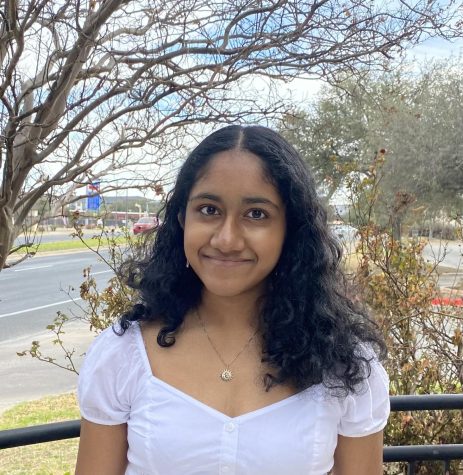
Class of 2024
Beyond an ardent adoration of the written word, my passion for Student Press stems from how my role invariably enables me to remain acutely...
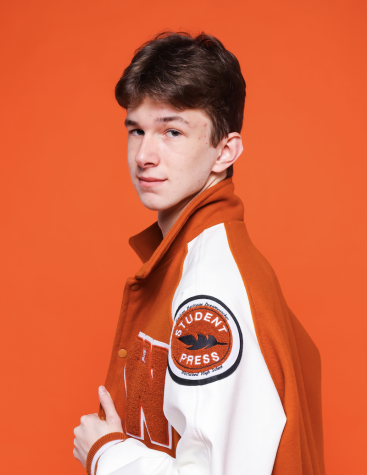
Class of 2023
I am currently Westwood Horizon's video editor, and also one of the hosts of Friendcast, our website's podcast video series. In addition...

![Westwood students experienced the impacts of class cuts resulting from Round Rock ISD (RRISD)s budget deficit. The recently approved general fund budget could have played a role in returning some of the cut classes. We all hope that [the general fund budget] will bring additional funding and cost savings, potentially help with course and extracurricular operations, and provide deserving teachers with an increase in salary as well as provide better education opportunities for students, Marlene Luo 25 said.](https://westwoodhorizon.com/wp-content/uploads/2024/07/ww-pic-600x479.jpg)
